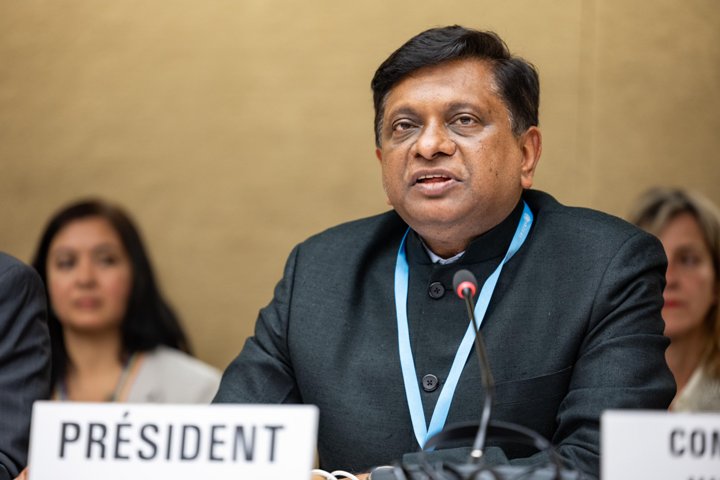India Advocates Collaborative Health Initiatives at BRICS Health Ministers’ Meeting
The Union Health Secretary also addressed the issue of Antimicrobial Resistance (AMR), describing it as a global challenge to BRICS nations' health and well-being.

- Country:
- India
Shri Apurva Chandra, Union Health Secretary of India, addressed the BRICS Health Ministers’ Meeting held on the sidelines of the 77th World Health Assembly of WHO in Geneva today. In his address, Shri Chandra emphasized India’s active engagement in BRICS health initiatives, highlighting efforts to strengthen health systems across BRICS nations to tackle critical global health challenges.
"India has demonstrated active engagement in BRICS health track initiatives, promoting collaborative endeavors to advance joint health agendas aimed at fortifying health systems across BRICS nations, thereby addressing critical global health challenges," Shri Chandra stated. He noted India's focus on establishing a BRICS integrated Early Warning System for preventing mass infectious risks in accordance with the International Health Regulation and enhancing disease surveillance through the One Health approach.
Shri Chandra highlighted the launch of the BRICS Vaccine Research and Development Centre during India's presidency, with the Indian Council of Medical Research-National Institute of Virology (NIV) designated as the coordinating agency. "ICMR along with NIV and a network of other partner Institutes is embarking on phase-3 clinical trials of a recombinant dengue vaccine. Additionally, research and trials for locally endemic diseases such as Kyasanur Forest Disease (KFD), Nipah virus, Human Papillomavirus, MTBVAC (Mycobacterium Tuberculosis Vaccine), and Influenza have also been extended to ICMR and other partners," he stated.
The Union Health Secretary also addressed the issue of Antimicrobial Resistance (AMR), describing it as a global challenge to BRICS nations' health and well-being. "India's national action plan on AMR, launched in 2017, focuses on cross-sectoral collaboration and the One Health approach, aligning with the WHO's Global Action Plan. India recognizes AMR as a global concern and advocates for collaboration among BRICS nations to devise and execute protocols, projects, and platforms aimed at addressing AMR through comprehensive measures such as data analysis, laboratory quality control, epidemiological assessment, and training initiatives."
Furthermore, Shri Chandra underscored the importance of advancing collaboration within BRICS countries in nuclear medicine and radio-pharmaceutical science, particularly in strengthening the radio-pharmaceutical supply chain, enhancing isotope production, and fostering the development and commercialization of advanced digital solutions.
He concluded his address by urging member states to enhance collaboration and work together to find solutions to various health challenges.
Ms. Hekali Zhimomi, Additional Secretary, Union Health Ministry; Ms. Aradhana Patnaik, Additional Secretary and Managing Director (NHM), Union Health Ministry; and other senior officials of the Union Health Ministry were present at the meeting.










